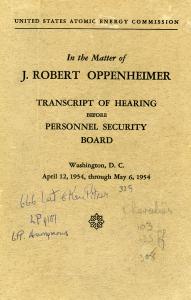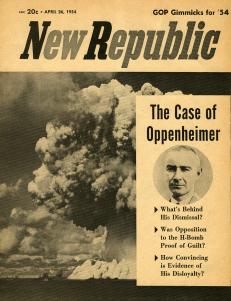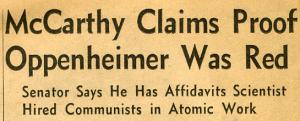
Pauling’s copy of the Oppenheimer hearing transcript.
[Part 2 of 3]
J. Robert Oppenheimer achieved prominence, first in the scientific community and later with the public at large, for his work in Los Alamos, New Mexico as the director of the civilian branch of the Manhattan Project during the Second World War. In the spring of 1942, he was asked to lead the project to develop an atomic bomb for use against the Germans, who were feared to be developing one as well. After the program succeeded, he was praised and showered with respect for his scientific work and managerial skill during the war.
In the years immediately following the war, Oppenheimer remained an important voice on nuclear policy, serving as a member of the Board of Consultants to the Atomic Energy Commission. Oppenheimer’s stature was also strong within the world of academia, and in 1947 he became director of the Institute for Advanced Study at Princeton University, home to Albert Einstein among many other luminaries.
However, in December 1953, less than a decade after the war’s end, Oppenheimer’s security clearance was revoked. Alleged to be maintaining communist ties and admonished for his opposition to the development of the hydrogen bomb, Oppenheimer was effectively exiled from the atomic community. As a result, a blank wall was erected between Oppenheimer and the secret data to which he once had access, and his sterling public reputation was put at severe risk.
The government’s about-face on Oppenheimer was a direct result of a redefinition by President Dwight Eisenhower of what it meant to be a loyal American. President Harry Truman had issued the first loyalty order in 1947, and under his definition, security risks were largely outlined as being political. With Eisenhower’s redefinition six years later, the risk was viewed as more general and based on character, stability, and reliability.
The language of Eisenhower’s new loyalty order, issued in April 1953, empowered the government to levy charges against Oppenheimer, based almost entirely on past suspicions of Oppenheimer’s loyalties. In 1947 Oppenheimer had admitted an association with the Communist Party in the 1930s, but within the constructs of Truman’s loyalty definition, Oppenheimer was allowed to continue his work.
In 1953, emboldened by the change in context brought about by Eisenhower, charges were brought against Oppenheimer by the Atomic Energy Commission (AEC), led by Chairman Lewis Strauss. This despite the fact that no breaches of security had been traced to the scientist.
In late December 1953, Oppenheimer was told that his security clearance had been revoked and secret documents that he held in Princeton were withdrawn. Given the chance to resign his AEC affiliation or face a hearing, Oppenheimer refused to step down, believing that doing so would serve as an admission of guilt.

The AEC hearing prompted important questions about the relationship between science and politics during the Cold War. Of the twenty-four charges brought against Oppenheimer, only one was new. Oppenheimer’s past ties with communism were known to many, having been voiced by the scientist to the House Un-American Affairs Committee in 1947. What was new, however, was the allegation that Oppenheimer squarely opposed the H-bomb. This allegation effectively served as the entry point for Eisenhower’s new definition of risk, as Oppenheimer’s essentially moral objections to the weapon were now under trial.
Many other questions also clouded the hearing, among them the problem of using old information for new allegations. The charges that were brought against Oppenheimer likewise commonly included vague claims, many of which began “it was reported…” and involved hazy dates or unidentified witnesses.
The charges were further countered by the prevailing belief within the scientific community that, without Oppenheimer, the first atomic bombs would not have been built as quickly as they were and that, even though he was against the development of the H-bomb at first, he never purposefully slowed down its development.
It would seem as well that Oppenheimer’s perspective was hardly unique. In fact, even Edward Teller, commonly referred to as “The Father of the Hydrogen Bomb,” explained in the Bulletin of the Atomic Scientists that the difficulties that were encountered with recruiting scientists to work on the weapon largely stemmed from their general dislike for the H-bomb.

Los Angeles Times, April 14, 1954.
The Oppenheimer hearing began on April 12, 1954 and lasted for four weeks. Already a high profile affair, its atmospherics became more pitched through the self-insertion of Senator Joseph McCarthy himself. McCarthy, as pointed out in a contemporary piece written by syndicated columnist Drew Pearson,
decided to jump into the Oppenheimer story only after the AEC investigation was well under way. As a result, Strauss was scared to death last week over where his probe he started is heading.
Indeed, McCarthy’s involvement and the trial’s placement in the public spotlight changed its nature dramatically. No longer was the hearing simply about Oppenheimer’s loyalty. Now the entire role of scientists in politics and the standards to which they were to be held was being examined. As Pearson’s column suggested, Commissioner Strauss came to regret having stirred up this particular hornet’s nest, worrying that his actions might alienate the scientists who were central to his success as AEC chairman.
Furthermore, Strauss’s hearing likely played into McCarthy’s hands by creating an opportunity for him to get involved in the debate. McCarthy had wanted to go after Oppenheimer before, but was advised not to primarily because his record had already been cleared in 1947. However, with the trial opened by a different party, McCarthy could now talk more freely about suspected spies in the atomic bomb program. If he was challenged, he only needed to mention Oppenheimer’s suspension as evidence for his point of view.
After nearly one month spent collecting testimony – including some twenty-seven hours given by Oppenheimer – the hearing finally concluded and, on May 27, the committee issued its decision: Oppenheimer’s security clearance was permanently revoked. The facts damning Oppenheimer’s position had not changed since they were first recorded six years earlier, but the conclusions drawn from these facts were new, abetted by Eisenhower’s revised security standard. In our next post, we will examine the broader reaction to the committee’s decision, including Linus Pauling’s very public response to the trial of his former friend.
